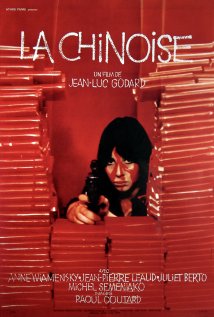Rayting:
7.2/
10 6.3K votes
Language: French
Release date: 26 March 1970
A small group of French students are studying Mao, trying to find out their position in the world and how to change the world to a Maoistic community using terrorism.
Similar Movies
5.3

Bachchhan Paandey 2022
6.2

Jug Jugg Jeeyo 2022
5.5

Senior Year 2022
7.0

Chip 'n Dale: Rescue Rangers 2022
5.8

The Man from Toronto 2022
6.0

Jayeshbhai Jordaar 2022
6.7

Minions: The Rise of Gru 2022
6.7

Fresh 2022


User Reviews
In 1966, Jean-Luc Godard made the acquaintance of some young members of the French Left who felt a strong pull towards Maoism. By looking to China, they sought to escape the traditional division of the French Left into supporters of the Soviet Union, which had lost its revolutionary fervour, and Trotskyist parties, which were impotent. (Of course, at the time the West was still generally unaware of the horrific toll of Mao's policies.) Godard, whose sociological curiosity and political engagement was strong in these years, decided to study this phenomenon, and the result is LA CHINOISE. While Godard would eventually go on to make a few films that were so didactically political that one felt bludgeoned by the message and watching was no fun, this one surprised me in how entertainingly its plot played out and how astute its observations were.
In a Parisian flat borrowed for the summer while one member's parents are away, a group of young radicals lodge together and fancy themselves a revolutionary cell. Chief among them are Guillaume (Jean-Pierre Léaud), Véronique (Anne Wiazemsky) and Yvonne (Juliet Berto). They read daily from Mao, decrying the Soviet Union and French society, and practicing their demagoguery for their occasional attempts to bring their message into the streets. Gradually, they come to decide that terrorism is necessary to achieve their goals, and they gang up on the sole dissenter from violence and kick him out of the flat. Francis Jeanson, a French academic and opponent of the war in Algeria, as well as Wiazemsky's actual thesis adviser, appears as himself in a scene where he attempts to dissuade Véronique from violence, asking just how much support from the oppressed masses does this sheltered girl think she has.
As desperate as he was for a cause to uphold, I don't believe that Godard really committed himself deep down to Maoism or revolutionary socialism in general. His bitterness against the staid French status quo is palpable, and he likes how the French Maoists at least recognized a need for change, but LA CHINOISE affectionately criticizes its subjects more than it celebrates them. Rather than presenting Maoism convincingly as a way forward, LA CHINOISE ultimately suggests it was only the most recent expression of the drive to rebellion that appears afresh in every young generation. While these characters are Maoists, he borrowed the basic outlines of the plot from Dostoyevsky, who described a set of young radicals well before Marxism-Lenin. The filmmaker underscores how such idealistic young people takes themselves too seriously, he shows their adoption of Maoist art as a sort of fashion statement, their use of Maoist terminology as the latest hip slang.
There are some fun touches here, the acerbic humour and amusing dialogue that Godard brought to his storytelling. The occasional use of Brechtian distancing techniques, like when Guillaume suddenly breaks character and talks to cinematographer Raoul Coutard, lead the viewer to reflect more on what is happening. And in spite of Godard's revolutionary sentiments, LA CHINOISE maintains a dialogue with the film tradition (cinephiles will chuckle at the avant-garde snippet that occasionally pops up in the soundtrack, a clear nod to Ingmar Bergman's film PERSONA).
Like Godard's early colour films, this is also a visual pleasure. Much of the first half of the film seems to me a study of faces: Léaud's famous expressiveness, Wiazemsky's quirky overbite and distinct way of moving her mouth to
Fmovies: Roman Polanksi once said that "people like Godard are like little kids playing at being revolutionaries", noting that he had actually grown up surrounded by the realities of communism. As a general rule I would always try to avoid a filmmaker's personal tastes, opinions and politics but, as La Chinoise is essentially a political statement, it's impossible not to let the Godard's politics affect my opinion of it. Sadly, Polanski's comment sums this film up perfectly.
There is no plot. What we are subjected to amounts to little more than a series of vignettes of utterly bourgeois adolescents rambling their tin- pot political philosophies from the comfort of their upper middle class apartments. Was this supposed to be ironic? Or are we supposed to buy into the ideas of these vacuous kids? It fails on both levels. All I wanted to do was give all of them a good slap across the chops and tell them to grow up.
Am I missing the point? Do I just not get it? Perhaps, and I'm fine with that. I truly love some of Godard's films; Vivra Sa Vie, Pierrot Le Fou, Le Mepris. The difference is that all of these films had something or someone for me to care about. The one thing that might have saved La Chinoise for me would have been for all the characters to catch bubonic plague and die horribly. That's would have cheered me up.
Stylistically the film has Godard written all over it but, by the time this film came out (in 1967), these flairs were already wearing a little thin, especially when they're essentially there to veil an utterly feckless piece of propaganda. The only point of vague interest here is the slightly eerie way in which this film precipitated the riots of May 1968. This alone, however, is not worth the 85 minutes of your life you will wish you could have back if you decide to sit through this twaddle.
I've heard some claim this as Godard's seminal work. I wouldn't say quite that, but its a great, and I think misunderstood, piece of work. Everyone discusses this film as if it were a critique of the May '68 Movement, forgetting that it was released the year before, and probably filmed two years before. Everyone thus views it as a satire of the past, when it fact it is a frightened critique of the contemporary. Godard does indeed think the "Maoists" the film follows are dilettantes, as the May '68 Movement proved to be, primarily, composed of. But he also wants desperately for a more militant presence to assert itself, and lead the contemporary situation into a more legitimately revolutionary direction. The seminal scene of the film is in the last act, when the student radical meets with her professor "radical" on a train. Both sides issue futile maxims. Godard overlays the words "this situation must change!" over their conversation. The pseudo-revolution of the 1960s, Godard prays, can become a real one. In retrospect, this is somber
La Chinoise fmovies. Not an easy film to comment on, or even appreciate, given its overt political content - but also the fact that I watched it, without the benefit of English subtitles, on French TV (amusingly, the French ones which accompanied the screening could hardly keep up with Godard's typically loquacious script!); unfortunately, my reception of this cable channel - which has been showing some pretty good, even rare, titles for years - hasn't been perfect in recent times...but, in spite of all this, I still couldn't afford to miss out on one of Godard's most famous films, right?
Anyway, the director's best and worst qualities are well in evidence here: with an obvious emphasis on the color red, it's visually stimulating, indeed overwhelming (as, frustratingly, Godard often puts text in his images while the characters are speaking!), and filled with both sight and sound gags (the French song about Mao and the 'little red book' is hysterical), in-jokes (Godard's voice is often heard indistinctly interviewing the characters) and innumerable pop-culture references. However, it's undeniably exhausting to follow in detail, with the relentless spouting of Communist ideology and wordplay sometimes going over my head in the process...and, by the end, it all sort of runs out of steam anyway - what with most of the characters giving up on their enclosed life-style of theorizing and taking up menial jobs instead, apparently to put in practice what they had so far merely preached - or something similarly vague...er...vaguely similar (why, it's gotten me mouthing abstractions, now!). The young cast is headed by popular "Nouvelle Vague" (and, apparently, politically-involved) stars such as Jean-Pierre Leaud, Anne Wiazemsky - who, for a while, became Mrs. Godard - and Juliet Berto.
Still, the film's anarchic, anything-goes attitude provides a good deal of amusement throughout; especially enjoyable is Wiazemsky's naïve interview, aboard a train, of a noted literary figure who turned conservative (which rebounds on herself and exposes her own political confusion!) and her own botched assassination attempt towards the end. Despite its necessarily heavy-going and obviously dated nature, LA CHINOISE - which has been released on DVD, though not in R1 land - is not quite the embarrassment that was, say, WHAT STALIN DID TO WOMEN (1969; which I watched only a few days ago)...and it's unfortunate that, for the next decade or so, Godard renounced mainstream cinema for underground political film-making (from which period I still have a couple of titles, British SOUNDS [1969] and ICI ET AILLEURS [1975], lying in my "Unwatched Films On VHS" pile)!
Shot a few months before his next masterpiece, La Chinoise is perhaps Godard's best film. The bourgeois Leninist-Communist struggle our commune is doing is both extremely tragic as is a comic one. The film is titled also 'a film in a making' and the film is indeed in a making with all the usual godard tricks such as actors talking to the camera, interviews showing the camera and the production men and so on. But these tricks come not without reason as we witness the group's struggle with what godard was struggling at the time: the fight in two ways. The artistic and the politic one. Godard as well known decided in 1968, a year after this film that 'a political intellectual has only one way to become one: stop being an intellectual' (this is not the precise quoting). This film struggles with some of the most modern and post-modern issues such as the function of language, and the implausibility of the fight against capitalism, and the modern necessity of being a bourgeois and a consumer. the only struggle that is possible is perhaps through art (theater) which is what our heroes do, and what godard is doing. and perhaps he had that notion all through his communistic period. Godard is for me the best Director ever. Each film is like a manifest. each line is poetry. each word is a world.
ido,
When Godard's LA CHINOISE was initially released, many commented on the fact that his latest movie might be called the further adventures of the children of Marx and Coca-Cola (the designation found in MASCULINE FEMININE). MASCULINE FEMININE had been in black-and-white, and was set in Paris in the winter of 1965-66; LA CHINOISE was in color (amazingly bright, Pop Art primary colors, mostly) and was set in the summer of 1967. Filming was so fast that Godard had the film ready for the Venice Film Festival in September of 1967 (where it won the Special Jury Award).
Just as MASCULINE FEMININE concerned a group of five friends (two boys, three girls), so LA CHINOISE has a group of five friends as its focus (two girls, three boys). The political discussions which had formed one strand in MASCULINE FEMININE now take over, and the film is about the political discourse which became so much a part of the radical Left in the period of the late 1960s and early 1970s. Yet though the film may seem didactic, it is also very tender in its regard for the protagonists. As with MASCULINE FEMININE, the film is filled with close-ups which show Anne Wiazemsky, Jean-Pierre Leaud, Juliet Berto and the others at their most open and vulnerable, for all the political posturings.
Again, as with MASCULINE FEMININE, LA CHINOISE is one of those movies that seemed to sum up the times for many of us who saw the film on its initial release: it just seemed to capture our lives with an immediacy and a relevancy that was startling. No filmmaker before or since has seemed to be able to be so contemporary. Now that period is part of the past, and the immediacy has been replaced by nostalgia, yet there remains a vitality that has kept this movie fresh.
Plus that "Mao, Mao" pop song is impossible to forget once you've heard it.